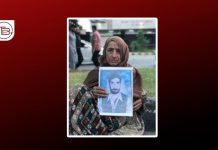Hundreds of blue Zamyads are lining up at the Pak-Iranian border for the past few days without food and water, waiting for the border to open so that they can continue their work as usual. The blistering sun, coupled with the non-availability of food and water, has taken a great toll on the health of the drivers. During the month of Ramadan, four drivers lost their lives due to starvation and dehydration.
The Pak-Iranian border was closed by the Pakistani authorities for “security measures” about a month ago. Thousands of families in Balochistan depend on the Iranian oil trade for their living. The border closure stranded hundreds of pick-up trucks and other vehicles loaded with oil canisters filled with petrol and diesel. With nowhere to go, these vehicles are stuck at the border with no food and water to sustain the drivers. Images and videos coming from the area show the desperate drivers and conductors digging wells in search of water. The temperatures there are rising to an alarming 40 degrees Celsius during the day.
In the absence of formal economy and job opportunities, the people of Balochistan are forced to opt for self-employment such as the unpredictable and dangerous smuggling of Iranian oil. Thousands of families throughout Balochistan depend on the transport of oil as a means of survival, and the recent border closure has deprived them of their means of subsistence. People in Balochistan consider the closure of the Pak-Iranian border a violation of their economic rights.
What is happening at the border?
The number of Zamyads – Iranian pick-up trucks used for smuggling fuel – passing through the border was virtually limitless. The border forces on both sides of the border charged a stupendous amount for a single transit, but the transport was smooth and fluent. The problem started when a given number of Zamyads were given token for crossing the border each day, and more checkpoints were established along the route. This drastically delayed the number of trips for the vehicles – they now had to wait for more than ten days for their next trip. Furthermore, the local shops and puncture-mending points along the way were also closed by the authorities.
The token system heavily affected the traffic along the border. Initially, 2000 vehicles could get token to cross the border each day, but that number was then halved and now only 400 vehicles can cross the border each day. This has led to increasing traffic along the border, and with nearby shops closed, the drivers are left without food and water.
Protests erupted in the Kech district against the token system, closure of shops and puncture-mending points and increased checkpoints, and now the death of the drivers. One of the drivers was Fazal Baloch, a resident of Turbat city, who was employed for a monthly salary of 18,000. He left his house for one of the crossing points on March 30, but he was stuck in the inescapable traffic. His food and water did not last long, and because the midway shops were closed, he could not get any. He started feeling unwell. His condition deteriorated and he breathed his last on April 15 – 15 days after he departed from his home.
During the protest in Turbat, the speakers said that they had not gathered for any political agenda but were demanding their basic rights. They said that the oil trade at the Pak-Iranian border has been the sole source of their income for the past several years.
A rally was also held in Gwadar where hundreds of individuals from different walks of life gathered to protest against the suspension of trade activities at the border. Addressing the gathering, the speakers said that the authorities must resume the oil trade, or they will block the main Makran highway in protest of their demands are not accepted by April 23.
According to protesters, Balochistan has been kept the way, which neither has the revenue nor the capability to provide economic opportunities for its people, putting restrictions on the oil trade is tantamount to deliberately starving the impoverished population to death. When it’s a matter of life and death, the citizens have every right to take to the roads and draw attention to their plight.






























